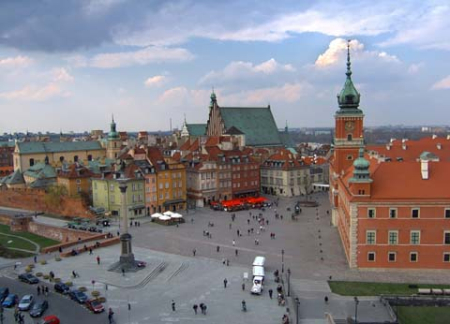Mark Mobius
In 2011, perceptions regarding the composition of the global economy underwent a shift - instead of the US being considered as the world's key growth engine, investors began to realize that large emerging economies such as China and India were increasing their contribution to global GDP.
While the US saw its long-term credit rating downgraded in August and the euro zone was the centre of heightened worries about sovereign debt for much of the year, some emerging economies witnessed positive growth in 2011.
That is not to say there were not challenges.
...
These are the big issues emerging economies face...
Image: High-growth economy of China lost some momentum.As most developed nations continued to implement very loose monetary policy measures, washing much of the global financial system with liquidity, many emerging countries had to reckon with higher prices for goods and services, appreciating currencies and, in some cases, "imported" inflation.
In their fight against high inflation, several emerging-market central banks embarked on tightening monetary policies for much of the year, which led to investors worrying about the prospects for economic growth.
Indeed, the high-growth economies of China and other emerging Asian and Latin American countries lost some momentum as the year wore on, but to us they now appear poised for softer landings than their developed-market counterparts.
...
These are the big issues emerging economies face...
Image: The US saw lower growth.Worries also surfaced during the year about the impact of slowing exports on emerging markets, due to lower growth in major trading partners such as the US and Europe.
However, strong domestic demand was a key driver of growth in 2011 in some emerging markets, especially in Russia, Turkey and Asia, with exports between different emerging markets also taking a greater role in boosting growth.
These dynamics highlighted the fundamental strengths of the emerging world, where many countries had lower debt-to-GDP ratios and higher foreign reserves than several developed nations.
Emerging market equities were not immune to the volatility that affected global equity markets in 2011.
...
These are the big issues emerging economies face...
Image: Arab Spring heightened uncertainty.Volatility began early in the year as political unrest in North Africa and the Middle East, the so-called "Arab Spring", led to the fall of some long-standing regimes and heightened uncertainty coupled with rising prices in global oil and gas markets.
Japan then suffered its biggest earthquake on record, followed by a tsunami and nuclear emergency, leading to sharp declines in the world's equity markets.
During the second half of 2011, worries about developed-market sovereign debt meant that global sentiment took a sharp turn for the worse and risk aversion spiked, leading to a flight out of emerging equities and into assets that most investors perceived to be safer, such as US Treasuries and cash.
...
These are the big issues emerging economies face...
Image: Largest declines were recorded by markets like Poland.As the year neared to a close, European policymakers made concrete steps toward resolving the regional debt crisis.
In addition, investors began to recognize the strength of US corporate earnings, and China made its first move in three years toward a more stimulative monetary policy.
These steps restored investors' confidence, to some extent, but emerging markets as a whole still ended the year with double-digit declines.
The largest declines were recorded by markets like Egypt, where political unrest flared up through much of the year, eastern European markets such as Turkey, Hungary and Poland, affected by regional concerns, and India, which saw a series of monetary tightening measures as the central bank battled to contain rising inflation.
...
These are the big issues emerging economies face...
Image: Select emerging markets, such as Thailand, fared considerably better.However, select emerging markets fared considerably better, most notably those in Southeast Asia, such as Indonesia, which ended the year in positive territory, as well as Malaysia, the Philippines and Thailand.
While several developed economies are still plagued by worries about their sovereign debt levels, many emerging economies are characterized by high growth rates, low debt-to-GDP ratios, and high foreign reserves.
We believe these fundamental strengths are likely to continue in the months and years ahead, and eventually be reflected in the earnings and share prices of emerging-market companies, over time.
...
These are the big issues emerging economies face...
Image: Brazil has cut interest rates.As growth in developed markets is generally expected to be much lower and fraught with fiscal challenges, we believe domestic demand in many emerging countries will play an even more important role in their prospective future growth.
Much of the growth in this domestic consumption could be driven by rising incomes and the maturing of a young, working population.
Going forward, one risk we see is high inflation - although inflation was relatively low in many emerging countries, in some cases it rose during 2011.
Recently, inflation has eased slightly in some countries, allowing them to move to a more stimulative monetary policy.
Brazil and Indonesia, for example, have already cut interest rates, and China eased banks' reserve requirements for the first time since 2008.
...
These are the big issues emerging economies face...
Image: Policies are needed to generate employment.This trend could continue in 2012 as, in an environment of slowing global growth and easing inflationary pressures, emerging markets revert their attention to stimulating economic growth.
Governments will also need to formulate appropriate policies to generate employment and address income inequality.
Another risk is market volatility. There will always be unforeseen factors and circumstances that might become catalysts for greater changes in the global landscape, as we have seen from the events of the past year.
We cannot exactly predict when the next market correction will hit us nor know how great or small it will be, but we do realize that market volatility is here to stay. But with every crisis comes potential opportunity.
...
These are the big issues emerging economies face...
Image: Another risk is market volatility.Therefore, we continue to invest with a long-term horizon in companies that we believe are undervalued, fundamentally strong and growing, and those that we think can weather difficult times.
From a long-term perspective, we continue to have a positive outlook on emerging economies.
In our opinion, balancing growth, inflation and global competitiveness will be the task ahead for many emerging countries in the months to come.
We believe that emerging stock markets could be much larger than they are today, and over the long term, their combined value could potentially exceed the combined value of the US, Japanese and European equity markets.
The author is Executive Chairman of Templeton Emerging Marketing Group. Excerpted with permission from franklintempleton.com











article